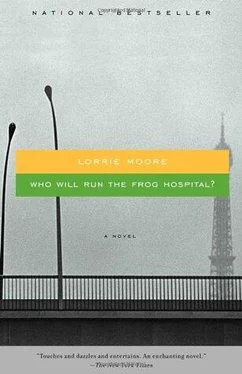I went into the bathroom. I touched the towels and towel bars and washcloths. I flicked on the light and opened the medicine cabinet: Q-Tips, nail files, and dark beeswax soaps. I opened the pill bottles and took an aspirin and a Tylenol. I dabbed cologne on my wrists, stripped naked, then got into the shower, where I washed my hair with her shampoo — an apricot-walnut one that smelled like her. I stayed there for a long time — used her back scrub brush and her creme rinse and let the bathroom fog up with steam. I lathered myself with a muddy scrap of beeswax soap I clawed out of the shower caddy. I felt close to her, in a larcenous way, as if here in the shower, using her things, all the new toiletries she now owned, I could know better the person she’d become. All evening I’d been full of reminiscences, but she had seldom joined in. Instead she was full of kindnesses — draping her own sweater around my shoulders, bringing me tea. How could I know or hope that she contained within her all our shared life, that she had not set it aside to make room for other days and affections and things that now had all made their residence and marks within her? Of course, I knew there were no reassurances. Or, there were only reassurances. She had offered them. “This place is just not the same without you,” she had said twice that afternoon. But I was greedy. Three was the magic number. I’d wanted her to say it one more time.
I got out, wrapped a towel around me, and went back to bed, where she lay still asleep, curved in a pale paisley, the sheet about her like an old tricot curtain. I slipped quietly under the covers, my hair wet, feeling the water bed give slightly beneath me like something gelatinous and alive.
“Did you just take a shower ?” Sils suddenly murmured, surprising me.
“Yeah, I did.”
She kept her eyes closed, and simply readjusted her pillow for sleep. “You were always a weird girl,” she said dreamily.
“I was?” I said. “I was not.”
She gave a lazy laugh. “You should invite me to where you live someday and see all the wacky things I’m going to do.”
“I will,” I said. “I will.” Though I already imagined that by the time I got back to my new job and life, with all its distractions and busynesses, that I wouldn’t know how. Or why. Despite all my curatorial impulses and training, my priestly harborings and professional, courtly suit of the past, I never knew what to do with all those years of one’s life: trot around in them forever like old boots — or sever them, let them fly free?
Of course, one couldn’t really do either. But there was always the trying, and pretending. And then there was finally someplace in between, where one lived.
I curled next to Sils and closed my eyes. I slept the light, watery sleep of a sick person who has already slept off the day and then awakened to night, not knowing what to do.
In the morning, she brought me coffee. She brought me a salad.
“This is the best salad I’ve ever had,” I said. For a brief moment, I decided, I would defeat nostalgia with caffeine. “This is better than all the others. This is the best salad of my entire life.”
“It’s the dressing,” she said. “A kind of breakfast recipe: it actually has bacon and eggs in it.” She shrugged and smiled.
I set my coffee aside. “Do you play the guitar anymore?” I asked.
“Only some,” she said.
“Do you still paint?”
“Naw.” She waved her hand dismissively. “Well, oh, I painted one thing,” she said, and she went out on the sunporch and brought back a small canvas on which she’d painted a bowl of fruit. In the painting of the bowl, which was silver, she’d included a reflection of a tiny figure of a woman, head into the wind, hair blown back. “That’s me getting ready to face middle age,” she said. And we both laughed in a loud, delirious way.
She was, probably, the nicest person I had ever known. Yet in the years following, for myself, I abandoned even believing in niceness or being nice. I could scarcely control myself, wherever I was, from telling everyone, anyone, what I thought of them. It was an urge, a compulsion, my tongue bitten a futile blue. That’s a ridiculous thing to say. You must have been spoiled as a child . I couldn’t stop myself. You are ungenerous. You parcel yourself out like an expensive spice. You idealize things; you’re a narcissist. You seek only to etch impressions of yourself on someone else’s face. It’s a form of cheapness. You’re cheap. You’re patronizing. You’re a fascist. You’re a bully. I’ve always hated bullies. You look awful in that color . It was as if I’d been hit on the head.
I left before noon. Sils walked me out to my car and gave me a long hug. “Aw, Berie,” she said, “how’d we get so old and far away,” and then she stepped backward, turning, and walked to the front porch, from where she turned again and waved. “I’m going to get a dog,” she said; certainly that was all that was needed to complete the scene.
“Sounds good,” I said stupidly. I started the car.
“Good luck with the Historical Society — whatever the hell it is you do there,” she called out.
“Photography curator. I organize old pictures,” I called back.
“That’s right,” she said. “Well, organize those pictures, girl!” She shook a fist and laughed. Then she brushed some hair off her brow and folded her arms across her chest. Her smile was broad at first, then tightened into something perfunctory. Perhaps she was suddenly embarrassed, as a woman, of what we had been to each other as girls. I waved again and honked my horn loudly, all the way down the street, under the canopy of summer trees and out into the main streets of Horsehearts.
• • •
I drove west five miles to a restaurant called the Horsehearts Country Restaurant. I was supposed to have lunch with LaRoue. “Go see LaRoue,” my mother had said. “She’s been depressed and calling us for money.” She had not moved to Florida with my parents, but had stayed north to work grooming fillies at the racetrack. She also worked sometimes as a janitor for a restaurant. Just for today she would get the owner of the restaurant to pay her in food. “A meal for me and my sister!” she’d exclaimed on the phone in a way that alarmed me. Her teeth had fallen out, and her dentures hurt her, so she didn’t wear them, she said, warning me in advance on the phone.
She was waiting for me in the restaurant foyer. She’d grown even heavier and her smile was more tentative but also wilder in its red, toothless spread. Her short, corn-colored hair sat like a cap on her head, but it seemed patchy, and was shaved at the nape. She came forward and hugged me, and with one thick arm still around me, she showed me to our table. Her nails, I noticed, had been bitten so low they looked like ragged bits of shell inlaid in her fingers. Her cuticles were grimy and frayed.
“So how’ve you been!” she kept saying when we were seated. “Order anything you want!”
Creamed chicken specials, plates of fried vegetables, cheese sandwiches with soup. It was hard to think of all the ways you’d never come through for people, closed them out, never loved them, and still order lunch. “It’s difficult to decide,” I said.
“Order anything! I’ve got this. I’ve got this taken care of.” She smiled.
“Are you sure?”
“Of course! I’ve been really looking forward to this!”
“You have? That’s really nice.”
“Honest to God, Berie. It’s true; I’ve missed you. I think of you and say, ‘What is that girl up to? I need to buy her lunch. I need to buy her anything she wants off the menu.’ ”
When, three years later, LaRoue hung herself in the county hospital psychiatric ward, the nurses arriving too late to cut her down, I would remember this exuberance, the hollow nervousness and yet the genuine sororal note, rattling around there, trying to get out.
Читать дальше












